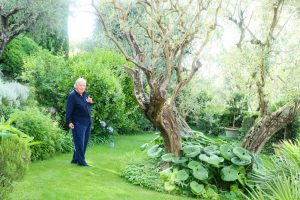
He always has an anecdote or a story to tell to take us to the realm of plants and trees, especially those of the Mediterranean. Jean Mus is an eternal traveler who carries in his heart this vegetation, high in colors and flavors. And he sows it with great art to all four corners of the world. Like an exalted painter, he is nourished with encounters when he composes the sensual notes of a poetic and breathtaking garden. This artistic creation is given to us every time, like an Eden garden to maintain and to love, as a recovered paradise.
A childhood that draws the outlines
Jean Mus was born in the country of Grasse, precisely in the village of perfumers, Cabris, and his father André was the chief gardener of the Villa Croisset. “He was a man of great kindness and sensitivity and knowledge. I learned from him the love of nature and the work well done.” He is marked by the staging of the gardens and by the work of the French landscaper, Ferdinand Bac. “Admiring the place where I lived started the passion of gardens in me.” And one of the most beautiful messages he will remember is that of his grandmother, who in the Provençal will say to him: “Pichoun, sieg curious!” (“Little one, be curious!”) These words will allow him to widen his eyes forever by discovering new horizons.
He will explore a unlimited world in nature. Once he had his diploma as a landscape architect at the Ecole de Versailles, he will return to his native South to immerse himself in the trade and gain initial experience. But his life will change at 26 when he will return from military service. He will settle down and meet Anny, an Armenian-born mathematics teacher from Cannes, who will become his wife and accompany him for 45 years in his career. “She had this wisdom before the artist, who is carried away by utopia, and has always brought me the rationality that makes ideas succeed.” With Florence, their daughter, he now shares his office where he continues to pursue ever more innovative projects all over the world.

This beloved Mediterranean country

For Jean Mus, the art of the garden is necessarily linked to the love of its native Mediterranean. As a child of the country, he grew up among the flowers and scents of this region of Provence with sweet perfumes and so typical landscapes. But very early on, he was attracted to a wider garden, encompassing all cultures and Mediterranean identities. “That comes from my teenage years.” Musician, he had a Greek friend who initiates him to the tradition, food and culture inherited from the countries of the eastern coast. I realized then that the Mediterranean is an extremely rich variety of different identities as a color-chart. And he will always keep in perspective to work the permanent blending of nature, as much as that of landscapes, cultures and individuals. “All the plant coverage of Western Europe, especially in the nourishing character with the fruit trees and the vegetables, comes to us from Mesopotamia. Identity is a deep source which brings not only the roots, but the continuation and the conservation of all living species.”
When he is asked to choose the essential species for his garden, his love of the Mediterranean overflows in words, images, scents and emotions. In his opinion, one can have a beautiful garden all over the year by remaining simple in the forms and the structures. “But keeping always a few Mediterranean species!” His first statement is to the olive tree, “because it is the nourishing tree by excellence that allows trading thanks to its oil.” Then the fig tree “which brings a permanent sugar that can be kept all the year.” Then, the rose as every person in the world needs to perfume every morning. This rose is for the artist “a seductress, more feminine than all the other flowers” and her favorite remains the fragrant rose of Damascus. Next, the grenadier that is “the best dye of the world, and the tree of serenity because the punica granatum gives the assurance of having children.” The journey ends in communion with all the aromatic herbs that make the Mediterranean cuisine: thyme, rosemary and lavender… “because in a simple pouch, I have all the mood of the Mediterranean basin that is ready to accompany all the products of the planet.”
Jean Mus travels restlessly across the lands, private gardens and parks of the great properties of the South. This nature-loving gardener has created many Mediterranean gardens on the Côte d’Azur (Menton, Nice, Antibes, Grasse, Cannes, Saint-Jean-Cap-Ferrat and the Lerins Islands) and he is always passionate about this heritage at the four corners of the world. “ Whenever I move away from the mother house that is this Mediterranean, I need to draw a wink to remind us that it is there!”
Encounters and gardens
Jean Mus has created and fashioned over 1,500 extraordinary gardens in France and around the world. But most importantly, it is “the encounters that have made these gardens” because it constantly feeds him for his future creations and his personal development. And there is some special meetings in his life, like the one with the young son of the Maharajah when he was on in trip to the sources of the Ganges in India. He will advise him to learn to let the river flow. “When I heard these words, I was profoundly upset and it changed my gaze both in my life and my activity.” He is moved by a great humanistic approach, both of people and vegetation. “Once, to Americans from Brazil, we presented the garden of Villandry, which is the purest tradition of French gardens. They exclaimed: “Why do you not respect the freedom of trees by cutting them like that?”
For him, respect is the most important aspect. It included respect for a shared memory, knowledge and past experiences. But also that of trees and plants to create living gardens that are cultivated in good harmony with the place, the natural elements and the passage of time. “Excellence comes with the artists and architects who compose these gardens, but they need the complicity of gardeners.” This renowned landscape painter explains that there are always two phases: the birth of a garden in the imagination, by plans, decisions and realization, and then, its evolution with gardeners who will maintain it eternally. In his clear blue eyes, one reads that these gardens have a soul that goes back to the origin of humanity. And when they are given to witness a true communion between man and nature, they cherish the places of their presence. “Therefore, we should always respect the place and get back to the origin.” Where does the wind come from? Where does the sun set down? What are the dominant elements that exist? In order to work with them and not upset them by inputs. For Jean Mus, the sketch is therefore essential as well as the notion of simplicity. Without forgetting to always have the attitude of the guest who does not bother. “Intervene but do not disturb and learn patience.”

Create happiness

The garden is obviously the exaltation of the senses, and the master-gardener’s style is expressed through the emotions and sensations he feels by listening to the desires of his customers. “There is the importance of perspective and depth.” Then, as a staging, the garden becomes a jewel case to magnify the elegant and soft colors, movement, curves, lights, sounds and odors. “But everything is already there. Just open your ears to hear the rustle of the leaves, the flow of a stream and the buzzing of the bees.” And remember that the most beautiful thing you can say to a child is to draw a garden. “He does not know how to start because the garden is a dream!” The garden architect must therefore be a kind of poet that mobilizes all the senses to make this dream come true. “We want to go inside as if in a paradise.” And it is this quest every time that delights the creator: overcoming difficulties and finding solutions to draw happiness “with gardens that are more and more received as gifts.”
Jean Mus draws his vocation as architect of gardens throughout a lifetime. His thoughts, his encounters, his emotions and his sharing are the ones from which are born the marvelous gardens of his conception. Natural spaces that have given this artist an extraordinary humility that nothing alters, for he knows that no one has the hand put on nature, while its eternal presence accompanies all solitude. He is indeed a passer-by and a visionary who opens our eyes to the fragile and precious beauty of the world.
Interview held by Carine Mouradian on July 23, 2017, at Cabris (Provence Côte d’Azur)







